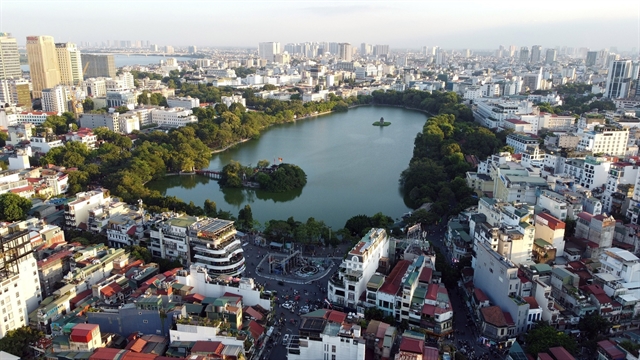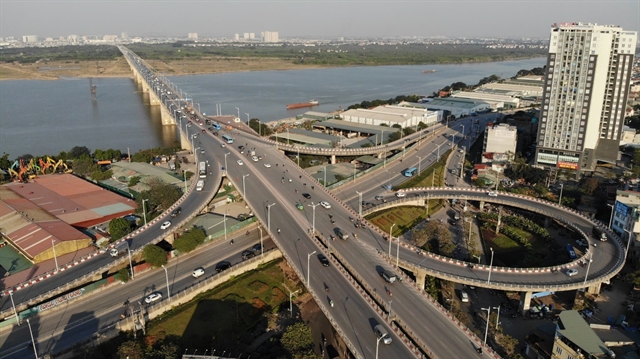 Society
Society

 |
| An aerial view of Hà Nội, where new policies are paving the way for an economic growth breakthrough. — VNA/VNS Photos |
HÀ NỘI — The 2024 Capital Law is seen as a decisive solution to many of Hà Nội’s longstanding development bottlenecks, opening the door for capital to accelerate comprehensive economic growth.
Yet even with rapid moves to apply its new, superior mechanisms, Hà Nội still faces a demanding journey if it is to realise its ambitious target of double-digit annual growth in the 2026-30 period.
A new wave of momentum
A major upgrade of the 2012 version, the law, particularly its Chapter IV on finance, budgeting and resource mobilisation, grants Hà Nội unprecedented autonomy. This new authority enables the city to mobilise domestic and external resources more effectively, strengthening its foundations for sustainable development.
A key provision allowing advance payments from the Financial Reserve Fund will help Hà Nội respond more promptly to economic shocks, natural disasters or epidemics, limiting supply chain disruptions. Meanwhile, permission to establish a venture capital fund is expected to open new financing channels for high-tech start-ups, an area the city aims to elevate into a competitive regional strength.
Another transformational change is the mechanism separating compensation and resettlement into independent projects. This long-awaited reform removes a major legal bottleneck, enabling faster release of prime real estate and reducing the timeline for major transport and urban development projects from up to seven years to roughly two to three years.
Streamlined rules for Public-Private Partnerships (PPPs) and build-transfer investment, together with more generous tax and land incentives for strategic investors, are also expected to attract tens of billions of US dollars in private and foreign investment.
In response, the Hà Nội People’s Council and People’s Committee have moved quickly to issue resolutions and detailed guidelines. The city has already developed most of its new preferential mechanisms, ranging from incentives for semiconductor and high-tech industries to policies leveraging Hà Nội’s cultural and heritage assets to build the cultural economy.
A notable step forward came during the July session of the People’s Council, which approved a resolution to attract strategic investors. Priority areas include satellite cities, urban railways, mass transit systems, high-tech zones with investment of at least VNĐ25 trillion (nearly US$949 million) and major environmental treatment projects.
 |
| New bridges over the Hồng (Red) River help ease traffic congestion and promote economic, social and cultural development across the capital. |
Stronger incentives, clearer rules
According to Deputy Director of the Hà Nội Department of Finance Lê Trung Hiếu, the revised Capital Law opens the door for Hà Nội to apply far stronger investment incentives.
"The city can now offer significantly reduced tax rates – up to 50 per cent below national norms – for strategic high-tech projects, along with targeted incentives for R&D, high-quality healthcare and education, the green economy and other high-value sectors," Hiếu said.
In July, the People’s Council rolled out a new framework for selecting strategic investors. The criteria include a minimum charter capital of VNĐ200 billion, concrete technology-transfer commitments and a requirement to complete projects within 36 months, helping curb speculative or inefficient investment.
Hiếu said these measures are designed to ensure Hà Nội attracts the right investors with the right capacities, particularly as the city accelerates administrative reforms.
"A multilingual electronic one-stop system, available in English, Chinese and Japanese, has shortened processing times for investment certificates from 15 days to just five to seven days for standard projects, and to only three days for strategic ventures," he noted.
Early signs of impact
Although the reforms are still taking root, their initial impact is already visible. In the first 10 months of this year, Hà Nội recorded strong economic performance across multiple indicators.
State budget revenue reached VNĐ564.2 trillion, exceeding annual estimates by 9.8 per cent and rising 35.8 per cent year-on-year. FDI climbed to $3.9 billion, 2.4 times the figure of the same period in 2024. Industrial production grew 6.9 per cent; retail sales rose 12.7 per cent; export turnover increased 8.3 per cent; and international visitors were up 21.9 per cent.
These results suggest that Hà Nội is beginning to translate its enhanced autonomy into tangible gains. Administrative bottlenecks are gradually easing, investment flows are increasing and heritage assets are being integrated with modern digital tourism models, injecting fresh vitality into the capital’s economy.
While the law expands the city’s financial resources and strengthens its institutional framework, experts argue that determined execution will be crucial if Hà Nội is to sustain double-digit growth.
Dr Nguyễn Đình Cung, former head of the Central Institute for Economic Management, said he believes Hà Nội can achieve 10 to 11 per cent annual GRDP growth from 2026 to 2030 – but only if it uses land resources more efficiently and attracts high-quality foreign investment.
He also highlighted the need to eliminate overlapping administrative procedures and invest in robust big-data systems to improve economic forecasting.
Associate Professor Dr Ngô Trí Long, former director of the Institute for Price and Market Research under the Ministry of Finance, said that with 30 per cent of the labour force holding university degrees, Hà Nội has a strong foundation for digital transformation. If the digital economy’s contribution can be raised to 40 per cent of GRDP, the city will secure a strong platform for sustained growth.
He said that Hà Nội must continue mobilising social investment through PPPs to complete Ring Roads 4 and 5 by 2028, develop high-tech agriculture and heritage tourism, and reduce licensing times to under 30 days.
The 2024 Capital Law is emerging not merely as a tool to dismantle institutional bottlenecks, but as a guiding framework for Hà Nội’s next era of growth, defined by new resources, technology and innovation.
Permanent Deputy Secretary of the Hà Nội Party Committee Nguyễn Văn Phong emphasised the need for the capital to focus on its key strengths to drive breakthroughs, including science and technology, innovation, digital transformation, cultural industries and tourism development.
Having led the nation in the innovation index for three consecutive years, Hà Nội now possesses both the foundation and the confidence to implement bold, transformative solutions in the period ahead, Phong said. — VNS




